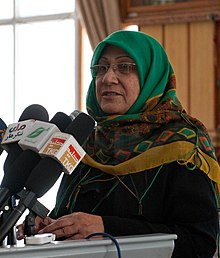Sediqa Balkhi
Sediqa Balkhi صدیقه بلخی | |
|---|---|
 Sediqa Balkhi in September 2013 | |
| Personal details | |
| Born | 1950 (age 73–74) Mazar-i-Sharif, Balkh Province, Afghanistan |
| Occupation | Politician |
Sediqa Balkhi (Dari: صدیقه بلخی) is an Afghan politician and former Minister in the government of Hamid Karzai.[1]
Early life[edit]
Balkhi was born in 1950 in Mazar-i-Sharif, Balkh province, Afghanistan. Her father, Ismael Balkhi, was imprisoned multiple times in Afghanistan and ultimately poisoned.[2] She completed her B.A. in Islamic Studies and pursued further education while staying in Iran. She taught for a while and worked as a manager.[3] She was married at a young age and had six children. Her brother, Seyyed Ali Balkhi, was an economist who was killed during the reign of the communist People's Democratic Party of Afghanistan.[2]
Career[edit]
Balkhi led the Islamic Center for Political and Cultural Activities of Afghan Women during the Taliban rule, which was based in Khorasan Province, Iran. She moved to Afghanistan in 1991 where she continued her work secretly.[4] In December 2001, she was one of three women who participated in the Bonn Agreement.[5] She was elected twice to the Meshrano Jirga (the Afghanistan senate). She served as the Chair of the Women's Affairs Committee in the Afghan senate.[2] She served the Minister of Martyrs and Disabled in the Hamid Karzai government from 2004 to 2009.[6] In 2005, Balkhi and Afghan army chief Bismillah Khan Mohammadi survived a helicopter crash. The crash is thought to be an accident.[7][8]
References[edit]
- ^ Ngunjiri, Faith Wambura; Madsen, Susan R.; Longman, Karen A.; Cherrey, Cynthia (2015). Women and Leadership around the World. IAP. p. 10. ISBN 9781681231518.
- ^ a b c "Sediqa Balkhi: 'He Said I Would Die If I Went to School Again'". Huffington Post. 2 April 2014. Retrieved 7 November 2017.
- ^ "Database". afghan-bios.info. Retrieved 7 November 2017.
- ^ Kitch, Sally L. (2014). Contested Terrain: Reflections with Afghan Women Leaders. University of Illinois Press. p. 75. ISBN 9780252096648. Retrieved 7 November 2017.
- ^ Skaine, Rosemarie (2008). Women of Afghanistan in the Post-Taliban Era: How Lives Have Changed and Where They Stand Today. McFarland. p. 8. ISBN 9780786437924.
- ^ Afghanistan Business Intelligence Report. Int'l Business Publications. 2000. p. 24. ISBN 9780739725009.
- ^ "Afghan minister survives attack". BBC. 10 September 2005. Retrieved 7 November 2017.
- ^ "Afghan Minister Escapes Gunmen". CBS. Retrieved 7 November 2017.
